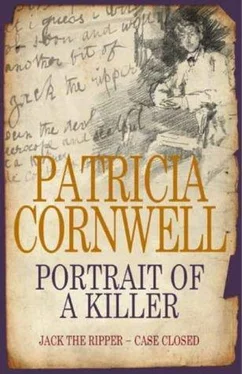Patricia Cornwell - Portrait Of A Killer - Jack The Ripper - Case Closed
Здесь есть возможность читать онлайн «Patricia Cornwell - Portrait Of A Killer - Jack The Ripper - Case Closed» весь текст электронной книги совершенно бесплатно (целиком полную версию без сокращений). В некоторых случаях можно слушать аудио, скачать через торрент в формате fb2 и присутствует краткое содержание. Жанр: Триллер, на английском языке. Описание произведения, (предисловие) а так же отзывы посетителей доступны на портале библиотеки ЛибКат.
- Название:Portrait Of A Killer: Jack The Ripper - Case Closed
- Автор:
- Жанр:
- Год:неизвестен
- ISBN:нет данных
- Рейтинг книги:5 / 5. Голосов: 1
-
Избранное:Добавить в избранное
- Отзывы:
-
Ваша оценка:
- 100
- 1
- 2
- 3
- 4
- 5
Portrait Of A Killer: Jack The Ripper - Case Closed: краткое содержание, описание и аннотация
Предлагаем к чтению аннотацию, описание, краткое содержание или предисловие (зависит от того, что написал сам автор книги «Portrait Of A Killer: Jack The Ripper - Case Closed»). Если вы не нашли необходимую информацию о книге — напишите в комментариях, мы постараемся отыскать её.
Portrait Of A Killer: Jack The Ripper - Case Closed — читать онлайн бесплатно полную книгу (весь текст) целиком
Ниже представлен текст книги, разбитый по страницам. Система сохранения места последней прочитанной страницы, позволяет с удобством читать онлайн бесплатно книгу «Portrait Of A Killer: Jack The Ripper - Case Closed», без необходимости каждый раз заново искать на чём Вы остановились. Поставьте закладку, и сможете в любой момент перейти на страницу, на которой закончили чтение.
Интервал:
Закладка:
I can't help but wonder if by 1907 Ellen secretly entertained doubts about her former husband, doubts that she dared not articulate and did her best to deny. But now a man was on trial, and should he be found guilty, he would be hanged. Ellen was a moral woman. If the slightest thing disturbed her conscience, she might have felt compelled to write a sealed letter to her sister. Ellen may even have begun to fear for her own life.
After the Camden Town murder, her mental and physical health began to deteriorate, and she spent most of her time away from London. She still saw Sickert now and then and continued to help him as best she could until she severed their relationship for good in 1913. A year later she was dead from cancer of the uterus.
Chapter Twenty-six. The Daughters Of Cobden
Ellen Melicent Ashburner Cobden was born on August 18, 1848, in Dunford, the family's old farmhouse near the village of Heyshott, in West Sussex.
At the end of May 1860, when Walter was born in Munich, the eleven-year-old Ellen was spending the spring in Paris. She had saved a sparrow that had fallen out of its nest in the garden. "A dear little tame thing it will eat out of my hand and perch upon my finger," she wrote a pen pal. Ellen's mother, Kate, was planning a lovely children's party with fifty or sixty guests, and was planning to take Ellen to the circus and to a picnic in an "enormous tree" with a staircase leading to a table on top. Ellen had just learned a special trick of "putting an egg in a wine bottle," and now and then her father wrote special letters just to her.
Life back in England was not so enchanting. In the most recent letter from Richard Cobden, he told his daughter that a violent storm had slammed the family estate and torn up thirty-six trees by the roots. A severe cold front destroyed most of the shrubbery on the estate, including the evergreens, and the vegetable garden would be barren come summer. The report was like a foreshadowing of the evil that had entered the world through a distant city in Germany. Ellen's future husband would soon enough cross the Channel and settle in London, where he would uproot the lives of many people, including hers.
Numerous biographies have been written about Ellen's father, Richard Cobden. He was one of twelve children, and his childhood was a desolate, harsh one. He was sent away from home at the age of ten after his father's disastrous business sense spiraled the family to ruin. Cobden's growing-up years were spent working for his uncle, a merchant in London, and attending a school in Yorkshire. This period of his life was physical and emotional torture, and in years to come Cobden could scarcely bear to speak of it.
Suffering bears the fruits of unselfishness and love in some people, and it did with him. There was nothing bitter or unkind about Richard Cobden, not even when he was battered by his most derisive detractors during his polarizing political career. His great passion was people, and he was never far from his pained memories of watching farmers, including his own father, lose everything they owned. Cobden's compassion for people gave him the mission of repealing the Corn Laws, a terrible piece of legislation that kept families poor and hungry.
The Corn Laws (corn meant grain) were enacted in 1815 when the Napoleonic Wars had left England almost in a state of famine. Bread was precious, and it was illegal for a baker to sell his loaves until after they had been out of the oven for at least twenty-four hours. If bread was stale, people weren't as likely to overeat and would "waste not and want not." The penalty for defying this law was harsh. Bakers were fined as much as five pounds and court costs. As a small boy, Richard Cobden watched the desperate come to Dunford and beg for alms or food that his own family could not afford.
Only well-off farmers and landlords profited, and they were the ones who would make sure that the price of grain remained as high in good times as it had been in bad. The landlords who wanted to keep prices inflated were the majority in Parliament, and the Corn Laws were not hard to pass. The logic was simple: Place impossibly high duties on imported foreign grains, and the supply in England stays low, the prices artificially high. The enactment of the Corn Laws was disastrous for the common worker, and riots broke out in London and other parts of the country. The laws would remain in effect until 1846, when Cobden won his fight to repeal them.
He was greatly respected at home and abroad. On his first trip to America, he was invited to stay in the White House. He gained the admiration and friendship of author Harriet Beecher Stowe after she came to visit him at Dunford in 1853 and the two of them discussed the importance of "cultivating cotton by free labour." In an essay she wrote a year later, she described him as a slender man of small stature who had "great ease of manner" and "the most frank, fascinating smile." Cobden was a peer to every powerful politician in England, including Sir Robert Peel, the father of the police force that would one day take on Cobden's future son-in-law, Jack the Ripper, and lose.
Richard Cobden was devoted to his family and became the only stability in his daughters' young lives after his only son, Richard Brooks, died at age fifteen in 1856. He was in boarding school near Heidelberg, and was healthy, mischievous, and adored. His mother had turned him into her best friend during her husband's frequent absences.
Ellen adored her big brother, too. "I send you a little curl of my hair, that you may sometimes think of one who loves you very much," she wrote him when he was off at boarding school. "You will write to me very soon and tell me how long it will be before I shall have the pleasure of seeing you." The affection was mutual and unusually sweet. "I shall bring down some presents for you," Richard wrote her in his boyish scrawl. "I will try to get you a little kitten."
Richard's letters hint at the mature, insightful, and witty man he might have become. He was a practical jokester whose April Fools' Day naughtiness included writing "kick me out of the shop" in German and giving the note to a French boy to present as a shopping list at a nearby grocery store. Yet Richard Brooks was tenderhearted enough to be concerned about a family friend's dog, who might need an "extra blanket" during the "east winds."
The boy's letters home were entertaining, and much too full of life to cause anyone to imagine that he would not grow up to be the perfect only son of his famous father. On April 3rd, Richard Brooks wrote a letter to his father from boarding school that would be his last one. He was suddenly stricken with scarlet fever and died on April 6th.
The story is made all the more tragic by an almost unforgivable blunder. The headmaster at Richard's school contacted a Cobden family friend, and each man assumed the other had wired Richard Cobden about his son's sudden death. Young Richard Brooks was already buried by the time his father got the news in a most heart-wrenching way. Cobden had just sat down to breakfast in his hotel room on Grosvenor Street in London and was going through his mail. He found the April 3rd letter from his son, and eagerly read it first. Moments later, he opened another letter that consoled him over his terrible loss. Stunned and beside himself with grief, Cobden immediately began the five-hour journey to Dunford, anguishing over how to tell his family, especially Kate. She had already lost two children and was unhealthily attached to Richard.
Cobden appeared at Dunford, ashen and drawn, and broke down as he told them what had happened. The shock was more than Kate could bear, and the loss of her beloved son took on the mythical proportions of Icarus flying into the face of the sun. After several days of denial, she fell into an almost catatonic state, sitting "like a statue, neither speaking nor seeming to hear," Cobden wrote. Hour by hour he watched his wife's hair turn white. Seven-year-old Ellen had lost her brother, and now she had lost her mother, too. Kate Cobden would outlive her husband by twelve years, but she was an emotionally stricken woman who, as her husband put it, "stumbles over [Richard's] corpse as she is passing from room to room." She could not recover from her grief and became addicted to opiates. Ellen found herself in a role too overwhelming for any young girl to play. Just as Richard Brooks had become his mother's best friend, Ellen became a replacement helpmeet for her father.
Читать дальшеИнтервал:
Закладка:
Похожие книги на «Portrait Of A Killer: Jack The Ripper - Case Closed»
Представляем Вашему вниманию похожие книги на «Portrait Of A Killer: Jack The Ripper - Case Closed» списком для выбора. Мы отобрали схожую по названию и смыслу литературу в надежде предоставить читателям больше вариантов отыскать новые, интересные, ещё непрочитанные произведения.
Обсуждение, отзывы о книге «Portrait Of A Killer: Jack The Ripper - Case Closed» и просто собственные мнения читателей. Оставьте ваши комментарии, напишите, что Вы думаете о произведении, его смысле или главных героях. Укажите что конкретно понравилось, а что нет, и почему Вы так считаете.












